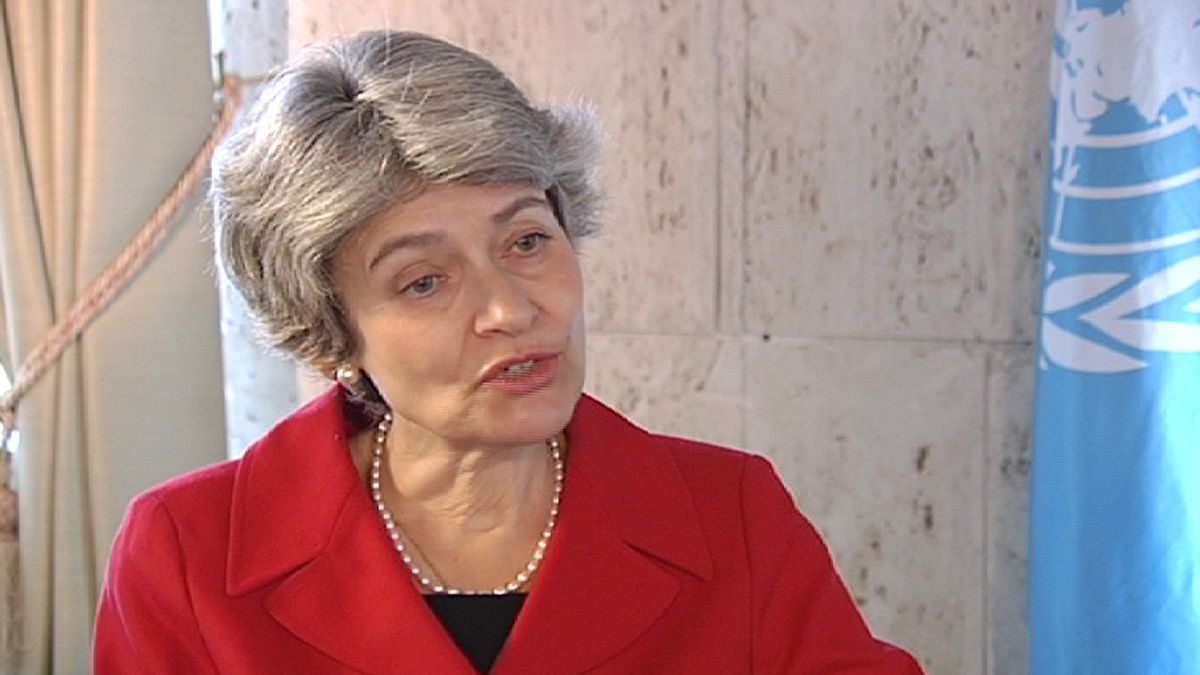UNESCO has welcomed the Palestinians as the 195th member; an historic, yet controversial move that has rocked the organisation.
The Palestinians won their place despite stiff resistance from the US and Israel.
But it came at a high price.
Bound by two laws that forbid subsidising any organisation that recognises Palestine as a state, Washington cut off funds, sending the UN’s education, scientific and cultural agency into financial freefall.
Euronews’ Andrea Bolitho spoke to Director-General Irina Bokova about the future of UNESCO.
She said: “The imminent repercussions I would say in financial terms are some difficulties that we have with the financement from the United States. There are other, wider repercussions, maybe more political; there are those who praise us, those who accuse us. Let me say that the question for the admission of Palestine in the organisation has been on the agenda for 22 years, it is not something new that came up but apparently member states, this time 107, decided to vote in favour.”
euronews: “What are the financial implications of the vote, how much is UNESCO down?”
Irina Bokova: “Well, having in mind that the United States contributes 22 percent to the regular budget then they also have between 15 and 20 million extra budgetary resources adding to the 72 million which represents annually the 22 percent. So we are talking about 100 million per year and then we have also the withholding of funds for 2012 for Israel, so it is quite substantial in terms of our budget.
“We have to have in mind that the United States have not contributed to the 2011 budget – this year. I have appealed to Congress and the American people and I do hope this message will pass and Congress will change this law in order to allow us to receive the funding.
euronews: “So there is a glimmer of hope that UNESCO may in the end get the funding from the US?”
Irina Bokova: “I hope so, I hope so.”
euronews: “Some of the projects which may be affected if the funding hole isn’t filled could concern the judicial system and water in Iraq; these are projects which are at risk, are there others which are also at risk?”
Irina Bokova: “First of all these are very important projects, our overall delivery of our programmes in both cases in Iraq and Afghanistan is jeopardised because you can imagine that witholding more than 22 percent, I would say for next year we have to accumulate the loss of this year, it will be more than 30 percent, it will jeopardise our delivery in the field.
“I would like to mention another such case, it is the work of our Intergovernmental Oceanographic Commission, which is very heavily involved, it is actually coordinating all the tsunami alert systems. When there was the tsunami earlier this year, the earthquake and tsunami in Fukushima in Japan we issued the alert in five minutes.”
euronews: “Some saw the vote and subsequent recognition as an abuse of UNESCO’s powers. Do you think the organisation has overstepped its mandate in making a political decision like this?”
Irina Bokova: “Well, it is difficult for me to decide, it was a decision by member states. What we regret at this particular moment is precisely this kind of criticism, this tendency to look at everything through the prism of this political decision and to neglect all the other important activities that we do.”
euronews: “I understand that UNESCO started a ‘click and donate’ programme for the public to give money to UNESCO which has not gone particularly well, not an enormous amount of money has been raised?”
Irina Bokova: “I never expected from this ‘donate to UNESCO’ campaign millions of dollars but it is an important citizen support for what UNESCO is doing. But at the same time we have to know that budgetary contributions from each member state are an obligation, a respect for the organisation and I believe that still the United States will change the law.”
euronews: “UNESCO’s core missions; helping eradicate poverty, education, freedom of expression, with these in mind how is the organisation reacting to the hopes and challenges presented by the Arab Spring?”
Irina Bokova: “We were very enthusiastic here with the Arab Spring because we do believe that it is a legitimate aspiration for more dignity, for more human rights, for better living and since the very first day we accompanied some of these countries on their path towards openness, democracy and different social and political order.
“Our first projects were to train Tunisian journalists to report on elections because even though they are simple things for many of us nowadays, they lack such experience. It is important that what we did in Iraq some years ago – supported by the United States – to change the curricula of the text books for children, to take away all the prejudices, all the hostility towards other cultures, religions or the West from Iraqi textbooks. I think it is very important that we do the same, and we will be doing the same in Libya.
“And, of course, the big question about the protection of heritage, of culture, of stealing of property, of illicit exports, of trafficking of such precious archaeological cultural objects from Libya, from Egypt, from Tunisia, it’s a huge responsibility that we have.
euronews: “UNESCO recently added several new cultural traditions to its ‘intangible cultural heritage list’. How does one protect something that is intangible?”
Irina Bokova: “It’s a very interesting question and let me say that the whole concept of intangible heritage was regarded only as a kind of African concept, but then gradually; I would say all countries in the world saw the merit of preserving this intangible heritage. This is very much linked to globalisation. By trying to protect, by respecting, by recognising the importance of even small local traditions, recognising it, we give enormous pride and self-respect to these communities.”
